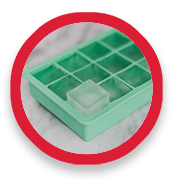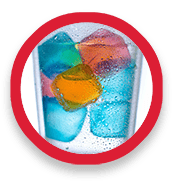SCIENCE EXPERIMENTS FOR KIDS
EXPLORE COLORS WITH ICE
Use this cool project to show your kids that before “Frozen” there was ice
Are your kids getting bored because you won’t let them watch a certain movie for the five-hundredth time? Help them to “let it go” by doing this fun project that shows them the effect color has on ice.
In this sunny day experiment, your kids can explore how colors affect the melting rates of ice cubes. Afterwards, they can go out and play since the cold never bothers them anyway.
GATHER THIS:
Per child:
- Different colored square pieces of paper or fabric larger than an ice cube
- 6 ice cubes
- Tray or newspaper for each child’s “workspace” (optional)
- Food dyes (optional)
THEN DO THIS:
- Ahead of time: Make small ice cubes, enough for each child to have 6.
- Put one ice cube on each color and place them all in the sun. Make sure all the ice cubes are exposed to FULL sunlight.
- Observe as the ice cubes melt – which melts the fastest and which melts the slowest? On warm days, stay and watch. On colder days, come back and check the experiment in 10 minutes.
ASK THIS:
During set up:
- Which ice cube do you think will melt the most quickly/slowly? Why?
- How will you know that the ice cube is melting?
When checking the progress:
- Which card is warmest/coolest?
- Which ice cube is melting the quickest/slowest? How can you tell?
- What would happen if you used food dyes to make colored ice cubes and tried the experiment again?
WHAT IS HAPPENING?
The ice on the black card will melt quickly as it absorbs the most light; it is the most efficient solar heat collector. The ice on the white card will melt slowly since it reflects most of the light. The other colors absorb all the light EXCEPT the ONE they reflect; this is the color that they appear to us.
WHAT THIS TEACHES:
Skills: Patience, observation
Themes: Light and energy, colors
Join the CuriOdyssey Community
LOCATION
1651 Coyote Point Drive
San Mateo, CA 94401
Ohlone Land Acknowledgement
650-342-7755
info@curiodyssey.org
CuriOdyssey is a 501(c)(3) non-profit, Tax ID 94-1262434




